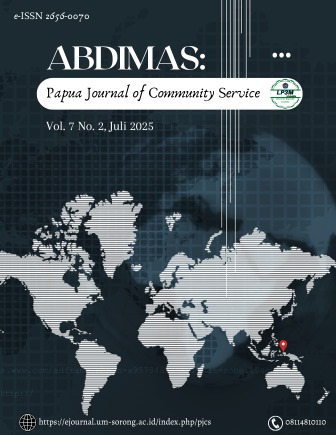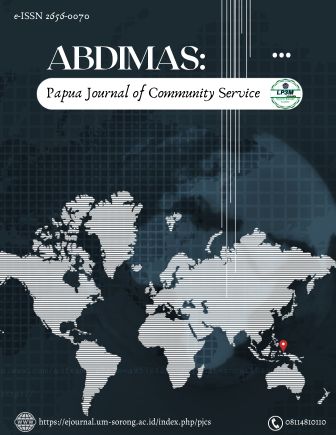Transformasi Pembelajaran Geometri dan Pengukuran melalui Gamifikasi: Meningkatkan Kreativitas, Logika dan Minat Belajar Siswa Sekolah Dasar
DOI:
https://doi.org/10.33506/pjcs.v7i2.4626Keywords:
Kreativitas, Logika, Minat Belajar, Gamifikasi, Geometri dan PengukuranAbstract
This community service activity aims to enhance creativity, logic, and student interest in learning at SDN 11 Kota Barat, Gorontalo, through the implementation of gamification in geometry and measurement lessons. Conventional, monotonous teaching methods often result in low student motivation and difficulty in understanding the material, especially in geometry and measurement. Therefore, gamification was chosen as a solution to boost motivation and make learning more engaging and effective.
The methods used include teacher training on gamification, development of media based on educational games, and direct implementation in the classroom. Students were involved in games that integrate the concepts of geometry and measurement to enhance their understanding interactively. Evaluations show that the application of gamification successfully increased student interest in learning, strengthened their understanding of the material, and encouraged greater student participation. Additionally, gamification also stimulated creativity and logical thinking in students when solving challenges related to the material. The results of this activity indicate that gamification not only increases student interest and involvement but also improves their understanding of difficult concepts. This activity provides a positive contribution to creating more interactive and enjoyable learning environments and can be applied to improve the quality of education in elementary schools.
Keywords: Creativity, Logic, Learning Interest, Gamification, Geometry and Measurement
References
Jaftha, N., & Chircop, T. (2022). Students’ Learning and Gaming Preferences and their Expectations of Gamification. MCAST Journal of Applied Research & Practice. https://doi.org/10.5604/01.3001.0015.8191
Komariah, I., & Sundayana, R. (2017). Meningkatkan Aktivitas Belajar Matematika Siswa Dengan Menggunakan Media Domat. Mosharafa : Jurnal Pendidikan Matematika. https://doi.org/10.31980/mosharafa.v6i3.455
Kovshova, Y., & Yarovaya, Y. A. (2022). Gamification as a means of activating the cognitive interest of schoolchildren in the process of integrating mathematics with other subjects. KANT. https://doi.org/10.24923/2222-243x.2022-44.49
Permata, C. A. M., & Kristanto, Y. D. (2020). Desain Pembelajaran Matematika Berbasis Gamifikasi untuk Meningkatkan Minat Belajar Siswa. https://doi.org/10.33603/JNPM.V4I2.3877
Razak, A., Ramdan, M., Mahjom, N., Zabit, M. N. M., Muhammad, F., Hussin, M. R., & Abdullah, N. (2022). Improving Critical Thinking Skills in Teaching through Problem-Based Learning for Students: A Scoping Review. International Journal of Learning, Teaching and Educational Research. https://doi.org/10.26803/ijlter.21.2.19
Sukiyanto, S., Kusumaningrum, B. Y., Anggreini, D., & Agustito, D. (2023). Pengaruh media pembelajaran matematika berbasis game edukasi kahoot pada pembelajaran tatap muka terbatas. Jurnal Karya Pendidikan Matematika. https://doi.org/10.26714/jkpm.10.1.2023.21-26
Taşkin, N., & Kılıç Çakmak, E. (2022). Effects of Gamification on Behavioral and Cognitive Engagement of Students in the Online Learning Environment. International Journal of Human-Computer Interaction. https://doi.org/10.1080/10447318.2022.2096190
Weinstein, N. (2023). A Gamified Experiential Learning Intervention for Engaging Students Through Satisfying Needs. Journal of Educational Technology Systems. https://doi.org/10.1177/00472395231174614
Wong Mee Mee, R., Subba Rao, Y., Seong Pek, L., Abd Ghani, K., Yee Von, W., Ismail, Md. R., & Shahdan, T. S. T. (2022). Gamifying education for classroom engagement in primary schools. International Journal of Evaluation and Research in Education. https://doi.org/10.11591/ijere.v11i3.21918
Wulandari, A. P., Cahyani, K., Nurazizah, T. S., & Ulfiah, Z. (2023). Pentingnya Media Pembelajaran dalam Proses Belajar Mengajar. Journal on Education. https://doi.org/10.31004/joe.v5i2.1074

Downloads
Published
Issue
Section
License

This work is licensed under a Creative Commons Attribution-ShareAlike 4.0 International License.
Authors who publish with this journal agree to the following terms:
Authors retain copyright and grant the journal right of first publication with the work simultaneously licensed under a Creative Commons Attribution-ShareAlike 4.0 International License. that allows others to share the work with an acknowledgment of the work's authorship and initial publication in this journal.
Authors are able to enter into separate, additional contractual arrangements for the non-exclusive distribution of the journal's published version of the work (e.g., post it to an institutional repository or publish it in a book), with an acknowledgment of its initial publication in this journal.
Authors are permitted and encouraged to post their work online (e.g., in institutional repositories or on their website) prior to and during the submission process, as it can lead to productive exchanges, as well as earlier and greater citation of published work

Papua Journal of Community Service is licensed under a Creative Commons Attribution-ShareAlike 4.0 International License



